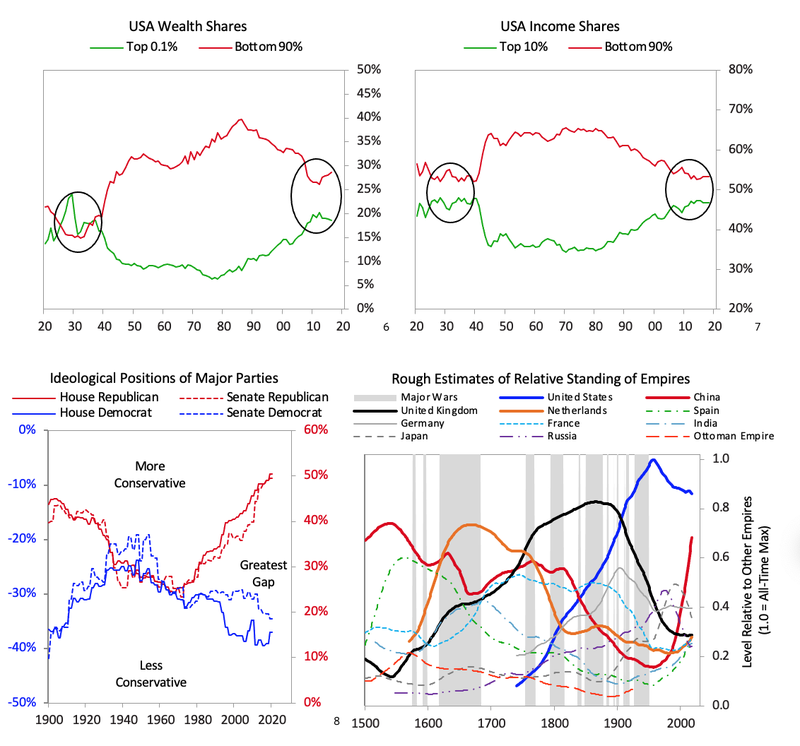- 02 Dec 2020 02:11
#15140624
Thanks for sharing. From the *political* standpoint, the issue is that there is a consistent *percentage* of the population that is unintentionally unemployed and/or homeless. Is society paying for a real estate agent to visit homeless people wherever they are, to transport them to a vacant, available dwelling of their choice? No? Why not? Does society and/or government prefer people to live on the streets rather than in vacant housing? Does this have anything to do with *real estate* property values, perhaps?
---
Could it be the case that you're racist as well -- ?
None of what you're saying here reinforces a position of 'social fatalism' -- you're actually arguing the *opposite*, that of individual *self-determination*, or free-will.
Okay, please confirm, by affirmation, that this is the position you subscribe to.
Are you a genetic-determinist, then? ('Selfish gene'?)
May I ask how you view the nature-nurture mix of determination? 50/50 -- ? 75-25 -- ?
Verv wrote:
@ckaihatsu , there are still homeless people due to choice.
I am not even kidding.
I lived above a homeless shelter for two years -- the rule there was that any homeless person could stay there indefinitely if they did not drink alcohol and followed other basic rules. Of course, they would also provide emergency medical aid to the homeless. All of the homeless in the area were also well dressed -- they distributed fresh clothes to them, and you wuold see them weekly with big shopping bags full of food.
The issue was that those who stayed homeless would be seen drinking at the bus stop benches or in the subway stations, all gathered together, sharing limitless amounts of alcohol.
The same is true in Minneapolis -- the Homeless shelters are revolving doors. The rule is the same -- no drugs & alcohol, and you can come in, shower, wash your clothes or get new ones, and stay indefinitely if you are on the straight & narrow. Most come in for 24 to 48 hours to get clean, get good sleep, dry out, and then go back out to get drunk or booze.
The real tragedy is that some of these are mental cases, and nearly all who are not mental cases are so addicted to substances they have become helpless to help themselves. The thing is, both in Korea and America the laws exist which respect the individuals right to self-destruction.
I saw a recent case of a many of us in the Seoul area knew because he was a homeless man who covered his entire face in shoe polish so he appeared black. Finally, there was a news special that investigated this man... He is mentally disabled, and had a chronic skin rash. The shoe polish made it so that his face did not itch -- yet, it made the rash worse, making it necessary for him to apply more. The woman he was seen with frequently was his older sister, also mentally disabled. Both ran away from their home -- the girl because she hated her older brother (perhaps he abused her in some way, though this is unknown), and the younger followed.
We learned that that the man with the shoe polish face also lived at a Catholic home for the mentally disabled for years where he was known as Gabriel. He still absolutely loved the Priest that he was re-introduced to, yet he would not return to live there because he did not want to abandon his sister... Both parties also love their parents, who inssited they could move back into the home, but they refused this again. They preferred to live on the streets like this, and the only change that was made was that Gabriel was treated long enough to abandon the need to put shoe polish on his face.
It was honestly a touching story... and the amazing point was that the efforts of journalists, the government, their parents, and even the Catholic church could not get both of them to stay in their parents home, a government shelter, or a private charity's shelter, and no law exists which can compel adults to do so against their own will.
Thanks for sharing. From the *political* standpoint, the issue is that there is a consistent *percentage* of the population that is unintentionally unemployed and/or homeless. Is society paying for a real estate agent to visit homeless people wherever they are, to transport them to a vacant, available dwelling of their choice? No? Why not? Does society and/or government prefer people to live on the streets rather than in vacant housing? Does this have anything to do with *real estate* property values, perhaps?
---
ckaihatsu wrote:
He was being socially *fatalist* based on alleged hard-wired / biological *racial* and cultural qualities. He was alleging that people could never be socially and culturally cosmopolitan, due to ingrained differences of *race* / biology. That's *racist*.
Verv wrote:
It is interesting to suggest that people cannot actually be cosmopolitan. This could be the case --
Could it be the case that you're racist as well -- ?
Verv wrote:
it is a mere illusion. Cultures never actually fully break down on a large scale.
Social fatalism is also a fine enough position. I think the Left draws on this heavily as well: who would think that the average white Southern Baptist from a wealthy background and racist family could ever fully 'overcome' this? It's a common trope. Indeed, we are told by some people that whites have to continuously struggle to overcome their ingrained bias... and I am sure it would not be too difficult to find people who would treat white racism as hard-wired.
None of what you're saying here reinforces a position of 'social fatalism' -- you're actually arguing the *opposite*, that of individual *self-determination*, or free-will.
Verv wrote:
There are also implications that there are fundamental, hard-wired differnces between race in terms of behavoral patterns.
In the book, he discusses how genes “affect” and “dictate” behavior which then affects “collective decisions and actions” while also stating that it is “conceivable” that history, and what affects human decision-making and reactions, are also “affected by the genetic identity of the people involved” (Kiaris, 2012: 11). Kiaris argues that genetic differences between Easterners and Westerners are driven by “specific environmental conditions that apparently drove the selection of specific alleles in certain populations, which in turn developed particular cultural attitudes and norms” (Kiaris, 2012: 91).
NotPoliticallyCorrect.Me
Okay, please confirm, by affirmation, that this is the position you subscribe to.
Verv wrote:
There are studies that try to show this...
They talk about certain allele patterns and try to link them to the expressions of individualism and collectivism.
In particular, it was the G allele that was associated with greater sensitivity to rejection. Additionally, this group also assessed the relationship of the A118G polymorphism to neural response during an actual episode of rejection in which the participant was excluded from an online ball-tossing game (Cyberball) with two supposed others. Consistent with the findings using the trait measure of sensitivity to rejection, individuals carrying the G allele also had greater levels of neural response to this rejection episode within multiple brain areas known to be involved in the processing of physical pain (dorsal anterior cingulate cortex and anterior insula). Thus, according to both self-report and neural data, genetic variation in the µ-opioid receptor is associated with sensitivity to social rejection.
Verv wrote:
Check out the chart available there that shows the proportion of populations with the G allele -- Sweden, Netherlands, Australia, Finland, Norway, USA, England, canada, Italy, etc. all have individualistic cultures overall, and have G allele frequencies below .2. However, S. Korea, Japan, Thaialnd, Hong Kong, Taiwan, China, etc., have greater gene allele frequencies, at around .3 up to .45 .5.
They also talk about the prevalence of MAOA-polymorphism -- high allele frequencies of the MAOA polymorphism would indicate greater individualism, and low expression would be less. Less than 20% of Swedes have low expression MAOA alleles, while nearly 65% of Japanese & Chinese have Low Expression MAOA Alleles, which correlates quite perfectly with the individualism-collectivism divide.
NCBI
Are you a genetic-determinist, then? ('Selfish gene'?)
Verv wrote:
This is pretty cutting edge stuff -- I am not sure that we can say any of it is set in stone.
But the idea is not absurd. There's a scientific basis to the idea of us inheriting psychological traits. If we have enough people in the same, shared gene pool comprising an ethnic group that creates a culture that have a certain psychological inclination, then we will see the whole culture of the group be more reflective of these psychological characteristics.
If in every four-person Japanese family, it is likely that at least 2 and very often 3 members have low expression MAOA alleles, then we can imagine that nearly every Japanese family will be far more inclined to accommodate the more collectivist features of this psychological profile... while Swedes will have the opposite effect: in the four person family where only it is likely that one or no people are collectivist inclined, there would be expected to be more individualism.
It's really stunning if it pans out.
May I ask how you view the nature-nurture mix of determination? 50/50 -- ? 75-25 -- ?
















 - By Rich
- By Rich - By JohnRawls
- By JohnRawls